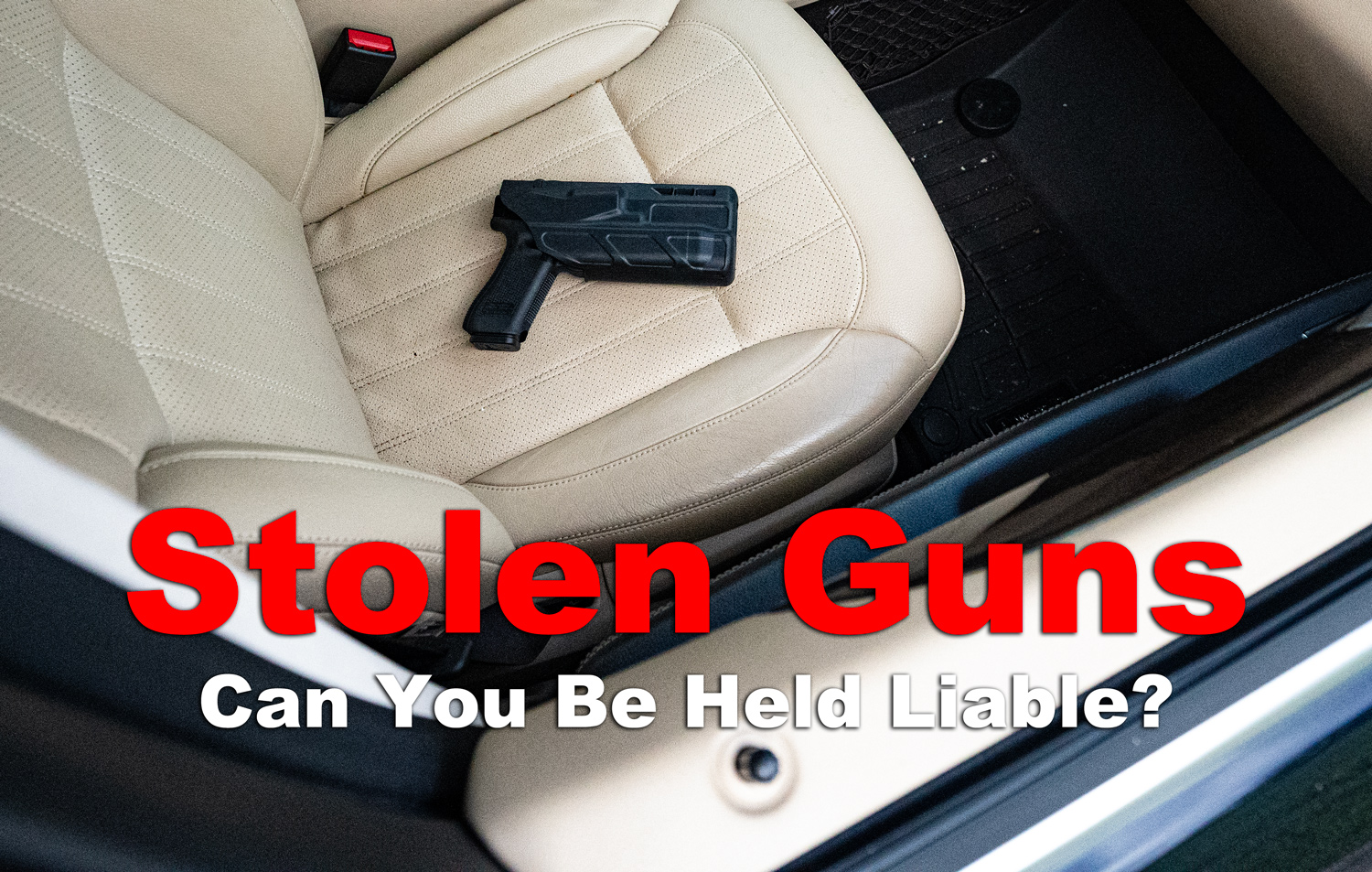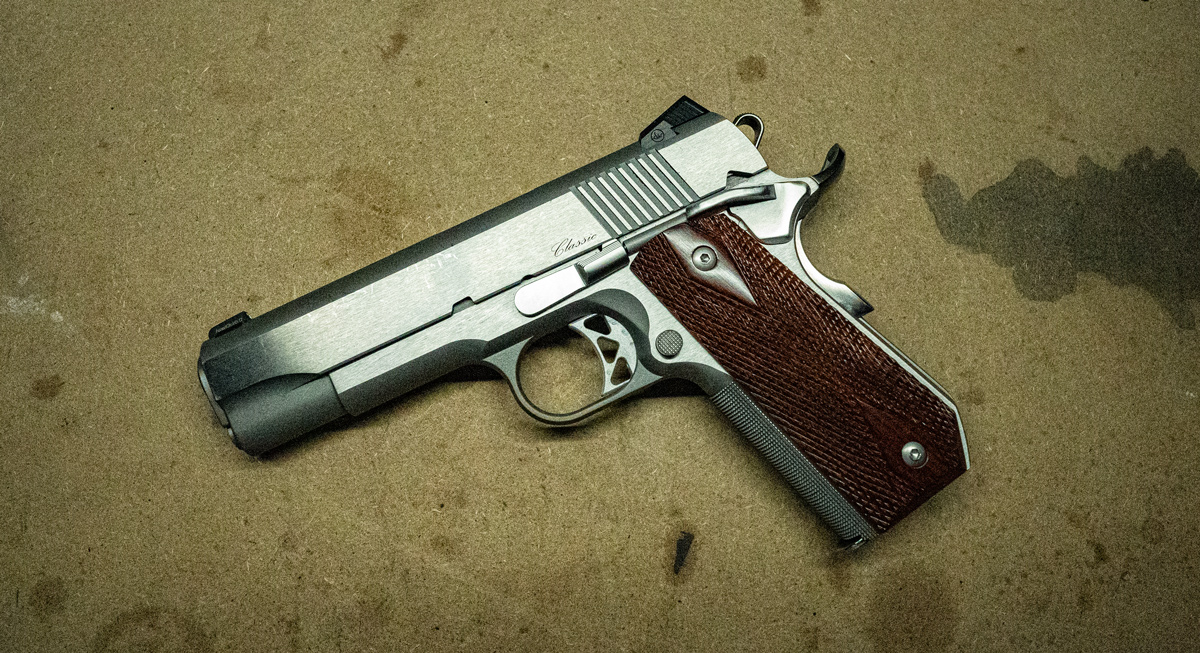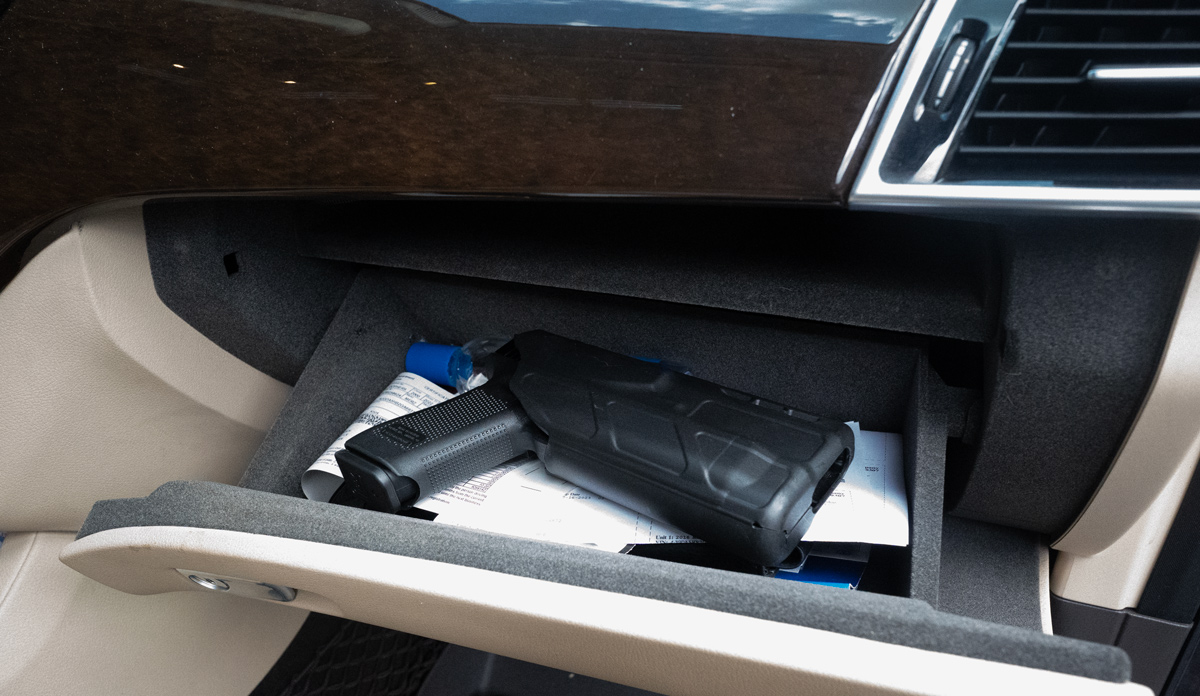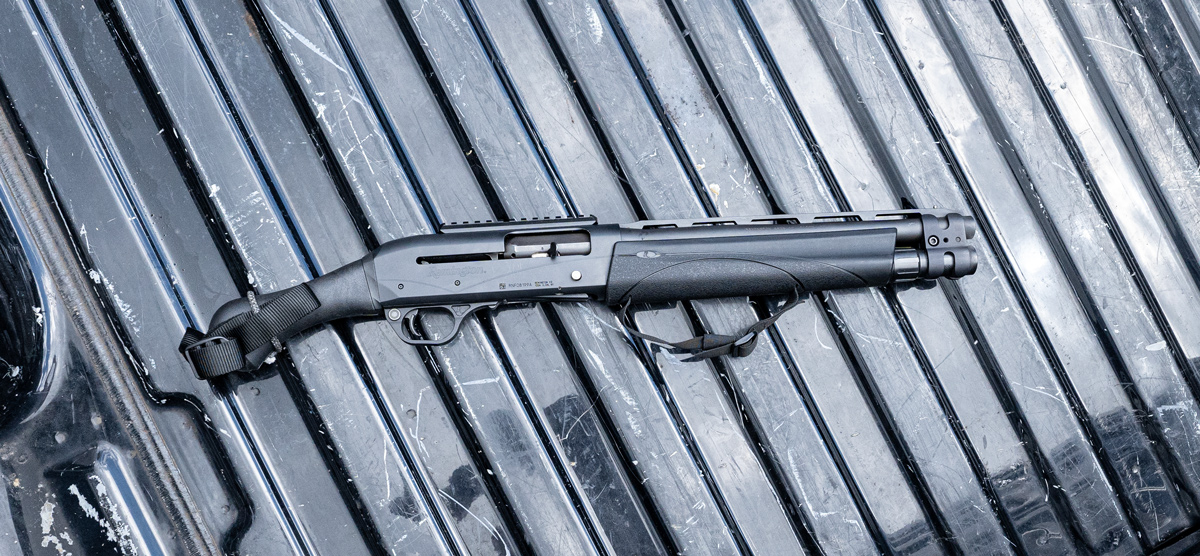What happens if you have one of your firearms stolen? Can you get in legal trouble as a result? We take a look at laws around the country and of course share some tips on how to ensure you don’t lose your firearms to a thief.
Americans lost more than 9,000 handguns (pistols and revolvers) due to theft in 2021. Almost 3,000 rifles were stolen or lost, along with nearly 2,000 shotguns. This is, quite frankly, a terrifying statistic and a black mark on the legal, and largely reliable gun-owning American public. So, how do you protect yourself and can you get in trouble if somebody steals your gun?
More Than Legal Liability
We’ll examine some of the potential legal consequences of a thief stealing your gun in a moment. But, the consequences of firearms that you lose possession of can be greater than a fine or jail time.
Stolen firearms have real consequences, consequences that are often tragic. In Tennessee, for example, a Glock pistol stolen from a car was found in the possession of an 18-year-old accused of murdering a 13-year-old child. In Minnesota, a stolen firearm was used to murder a woman during a domestic disturbance.
These are just two examples, among many, of stolen firearms used in heartbreaking crimes.
As a gun owner, your highest responsibility is the safe, secure storage of weapons. Firearm theft is a reality in the U.S.
We all need to do your part to reduce the chances of a theft, to be prepared in case of a theft, and know what to do if your firearm is stolen.
Note: Always review the laws in your area and speak with a qualified attorney, law enforcement official, or a legal expert.
State and Local Laws Weigh Heavily On Your Liability
Gun laws, like many laws in the United States, are heavily influenced by local and state regulations. The laws in California are different than the laws in Wyoming, which are different than the laws in Missouri, which are different than the laws in Connecticut.
Even different cities in the same state will have differing laws. Your liabilities can change depending on where you live.
Stolen Firearm: What are Your Liabilities?
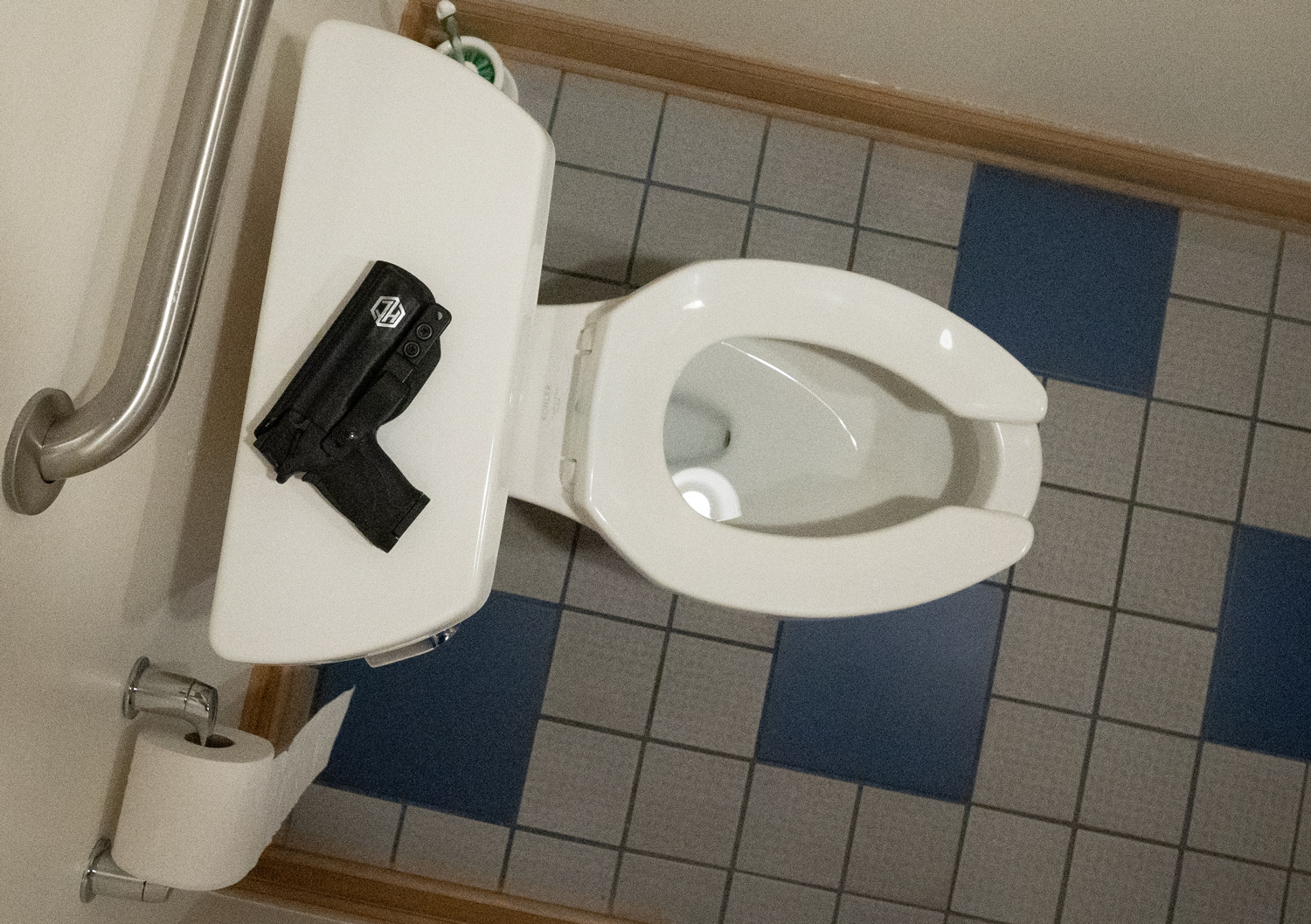
Federal law, in general, protects gun owners in the event of a stolen firearm. While each situation is different, if your gun is stolen, then used in a crime, you can not be charged with that crime. Criminal charges would rarely be brought against you.
However, if you don’t contact police after the incident (more on reporting thefts below), you could be charged with not properly reporting the theft.
While you may not be charged with manslaughter (for example) if your stolen gun is used in a crime, you could be charged with negligence depending on state law. Again, each state has different laws in this regard, but if you did not take reasonable security measures with your firearm, a charge of negligence could be issued by police.
While criminal charges against owners of a stolen gun are rare, civil charges are not. A victim or a victim’s family can sue you in civil court, especially if you were careless with the storage and security of your firearm.
Regardless of the legal ramifications, proper storage and safe handling of your weapon is a moral responsibility. It’s not only the right thing to do, but it helps protect the reputation of the gun-owning public, who are all too often portrayed as careless or reckless with their firearms. (A gun left in a public bathroom is an obvious story. The millions of owners safely storing their weapons in a locked case is not.)
But there are things you can do to protect yourself, protect the public, and reduce the chances of a stolen firearm.
1. Reduce Your Chances of a Theft
Regardless of all other details, regardless of the law, the type of firearm you own, and the specific purpose of those guns, you should always maintain safe, secure storage of your weapon.
At home, keep all of your firearms in a locked safe or cabinet. Whether you live in a quiet rural setting, a suburban cul-de-sac, or an inner-city apartment complex, this is the fundamental practice that you should maintain at all times. When you are not actively using or carrying the firearm, it should be locked away safely at home.
Don’t store firearms in your car. Vehicles are often a target for burglars, who rummage through cars or trucks looking for anything of value. If your gun is in the glovebox, the center console, the trunk, or underneath the seat, it’s an easier target for a thief. Even when hidden, guns are all too often stolen from cars.
The fewer people who know about your firearms, the better. While your best friend may not steal your handgun, what about his brother? What about his brother’s friend? What about his brother’s friend’s cousin? Word could get around that you have a collection of weapons in the home. It would not be hard for a criminal to find out when you are gone and exploit that information.
These are just a few tips. With a little diligence, you can significantly reduce your chances of a theft.
2. Be Prepared in Case of a Theft
Even when you are meticulous about gun security, you still need to take measures to protect yourself if your firearm is stolen. This essentially comes down to doing your due diligence as a firearms owner.
The biggest factor here is to keep detailed records on the firearm. Keep a document, even if it’s in writing, of the weapon’s make, model, and serial number. Write down where and how you bought the firearm and when it was purchased. Note the color, markings, decorations, any scratches or scrapes, and any other physical information. When keeping records of your firearm, you can’t be too excessive.
Also, it would not hurt to take photos of the firearm and store them with the document.
3. What Should You Do if a Firearm is Stolen
So what happens if your firearm is stolen? Even if you take the most meticulous measures to protect your weapon, a theft is always possible. In the event of a theft, you should immediately report the crime to local law enforcement.
In some states, you are legally required to report a stolen weapon. Even if your state law does not mandate reporting, most gun owners would argue it’s the right thing to do. The faster you report the incident, the greater your chances of having the gun found and (if you are fortunate) returned into your possession.
Once the incident is reported, it will be entered into a database of gun serial numbers, so all law enforcement can access the information. If you lost a gun without a serial number that makes things much more difficult and complicated. In this case, we’d encourage you to do more research than we’re qualified to give.
Police departments are extremely busy, so information on your firearm may not be reported back to you. Therefore, it’s a good idea to follow up with local law enforcement to see if there is any new information on your stolen firearm.
If we, the gun-owning public, want to maintain our right to bear arms, we have to be responsible with our weapons. This means proper storage and taking the right actions if a firearm is stolen. With these measures, we’ll take another step towards maintaining our right to keep and use firearms for hunting, target-shooting, and personal protection.
